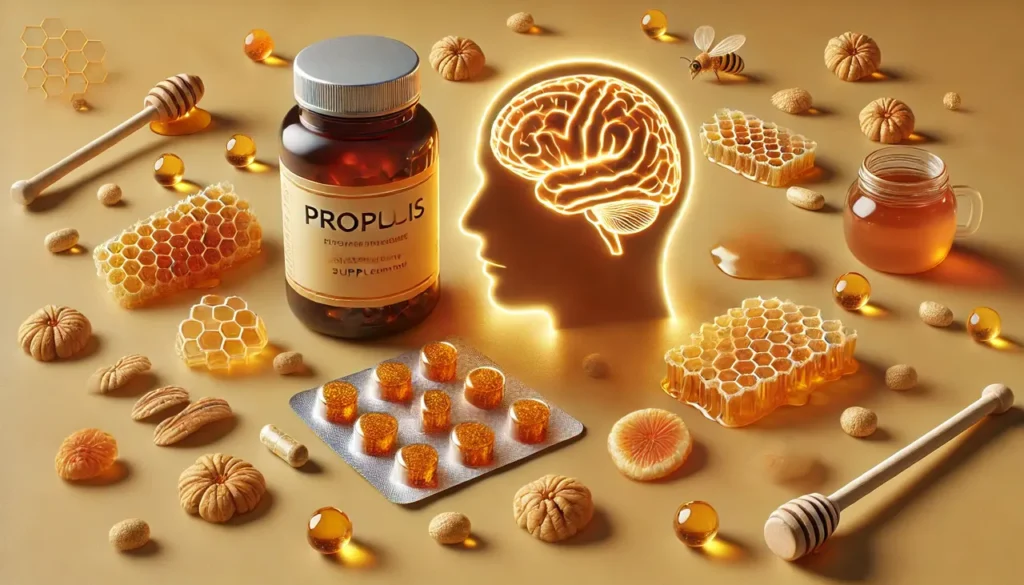Propolis, a natural resinous substance produced by bees from plant materials, has been used for centuries in traditional medicine for its health-promoting properties. Its wide range of biologically active compounds—including flavonoids, phenolic acids, and terpenes—contribute to its potential therapeutic effects. Increasingly, propolis is garnering attention as a potential nootropic supplement, known for its reported benefits to cognitive function and overall brain health. This article explores propolis as a supplement, examining its source, chemical composition, physiological mechanisms, and potential as a nootropic. Additionally, it discusses recommended dosing, possible side effects, interactions with other drugs or supplements, and precautions for individuals with certain health conditions.
You May Also Like:
Beeswax: Benefits, Dosage, Side Effects, Drug Interactions, And Other Important Information
Sources of Propolis
Propolis is a natural byproduct of bee activity, used by bees to reinforce and protect their hives. Collected from various plant resins and combined with beeswax, saliva, and enzymes, propolis is commonly found in the hives of honeybees (Apis mellifera). The composition of propolis can vary depending on the plant sources in the bees’ environment, leading to different types such as Brazilian green, red, or brown propolis.
The variability in propolis composition means that its health effects may differ by type and origin. Generally, propolis is rich in:
- Flavonoids: Antioxidant compounds such as quercetin, kaempferol, and pinocembrin, which support cellular health.
- Phenolic acids: Bioactive compounds like caffeic acid and ferulic acid, recognized for their anti-inflammatory and antimicrobial properties.
- Terpenes: These compounds contribute to the unique scent of propolis and possess immune-modulating effects.
Propolis can be consumed in various forms, including tinctures, capsules, powders, and extracts. It is often combined with other bee products, such as honey or royal jelly, for added health benefits.

Chemistry of Propolis
Propolis consists of over 300 compounds, with a majority of its active ingredients belonging to the flavonoid and phenolic acid families. The primary flavonoids include pinocembrin, chrysin, and galangin, which have been studied for their effects on brain health. These flavonoids have antioxidant properties, which could help protect cells from oxidative stress and support the body’s natural defense against inflammation.
The phenolic acids in propolis, such as caffeic acid phenethyl ester (CAPE), have been shown to have neuroprotective effects. CAPE, in particular, is known to modulate inflammatory pathways in the brain and may reduce neuronal cell death associated with conditions like Alzheimer’s disease. Other compounds, like terpenes and essential oils found in propolis, also exhibit antimicrobial and anti-inflammatory properties, supporting overall health.

Physiological Mechanisms of Propolis in the Body and Brain
Propolis exerts several beneficial effects in the body and brain due to its high antioxidant and anti-inflammatory potential. Here are some of the main mechanisms by which propolis supports cognitive health:
- Antioxidant Defense: Propolis compounds like flavonoids and CAPE neutralize reactive oxygen species (ROS) in the brain, thus reducing oxidative stress. Oxidative damage in neurons is associated with cognitive decline and neurodegenerative diseases, making propolis a potential neuroprotective agent.
- Anti-Inflammatory Action: Propolis influences inflammatory pathways, particularly by inhibiting nuclear factor-kappa B (NF-κB), a protein complex involved in inflammatory responses. Reducing inflammation in the brain could help mitigate cognitive impairments and protect neural cells from chronic stress.
- Neuroprotection and Cognitive Enhancement: Research has shown that the flavonoids in propolis can enhance neural plasticity, which is essential for learning and memory. By supporting the production of brain-derived neurotrophic factor (BDNF), propolis aids in the growth and survival of neurons.
- Immune System Support: Propolis has immunomodulatory effects that help balance the body’s immune responses. A well-regulated immune system reduces the risk of neuroinflammation, which is increasingly recognized as a contributing factor in cognitive decline.
- Mood Regulation: Certain compounds in propolis, such as chrysin, may affect neurotransmitters like GABA (gamma-aminobutyric acid), which plays a role in mood and stress regulation. This effect could potentially alleviate symptoms of anxiety and improve mental clarity.
Support Brain Function, Immunity, and Overall Health with Propolis—Shop Now on Amazon!

Nootropic Benefits of Propolis
Due to its combined antioxidant, anti-inflammatory, and neuroprotective actions, propolis may offer several potential nootropic benefits. The following are some of the main cognitive benefits associated with propolis supplementation:
- Improved Memory and Learning: The neuroprotective effects of propolis may enhance memory retention and learning capacity, as its active compounds support neural health and cognitive processing. The promotion of brain-derived neurotrophic factor (BDNF) by flavonoids in propolis is particularly crucial for these cognitive functions. Regular supplementation with propolis may help sustain memory as we age, providing a natural approach to combating cognitive decline associated with aging.
- Enhanced Mental Clarity: Propolis may improve mental clarity and focus by reducing oxidative damage and inflammation in the brain. This benefit could be especially useful for individuals experiencing brain fog or cognitive sluggishness. Additionally, the reduced oxidative stress could help maintain healthy neuron function, which is essential for sustained mental sharpness and focus throughout the day.
- Protection Against Neurodegeneration: Propolis’ antioxidative and anti-inflammatory properties may help reduce the risk of neurodegenerative diseases, such as Alzheimer’s and Parkinson’s. By limiting oxidative stress and inflammation, propolis supports long-term cognitive resilience. This natural protection against neuronal damage could be particularly valuable for those with a family history of neurodegenerative conditions.
- Mood Stabilization and Stress Reduction: Some studies indicate that propolis can influence neurotransmitter levels, particularly GABA, contributing to mood stabilization and stress relief. This can be beneficial for individuals looking to improve both cognitive performance and emotional well-being. Regular use of propolis may also aid in maintaining a balanced mood, potentially reducing the impact of daily stressors on mental health.

Dosage and Supplementation Guidelines
While there is no established recommended daily allowance (RDA) for propolis, studies have explored its therapeutic effects using various dosages. Propolis is generally safe in moderate amounts, but dosages can vary depending on the type and form of supplementation.
- General Dosage for Cognitive Support: For general brain health, doses between 500 mg and 1,000 mg per day are typically used. Propolis capsules or tinctures are the most common forms for achieving this dose.
- Nootropic Dosage: To harness its full nootropic potential, a daily dosage of 1,000–1,500 mg may be considered, divided into two or three doses throughout the day. This allows for sustained release of its active compounds and ensures consistent antioxidant protection.
- Specific Forms of Propolis Supplements: Propolis supplements are available as capsules, tinctures, and powders. Alcohol-based tinctures may provide higher bioavailability, while capsules offer a convenient option for regular supplementation.
- Long-Term Use: Propolis is generally safe for short- and long-term use, although it is advised to take breaks (such as a two-week pause after every three months of continuous use) to prevent possible tolerance or mild allergic reactions.
Experience the Benefits of Propolis for Brain Support and Immunity—Shop Amazon’s Best!

Side Effects and Safety
Propolis is generally safe for most people when taken in recommended dosages, but some individuals may experience mild to moderate side effects, particularly if they have bee allergies or sensitivities to plant resins.
- Allergic Reactions: Individuals with known allergies to bees, bee products, or certain plants may experience allergic reactions to propolis, including skin rashes, itching, or swelling. Severe reactions may include anaphylaxis, requiring immediate medical attention.
- Gastrointestinal Disturbances: Some users report mild digestive discomfort, such as nausea, bloating, or diarrhea. This is more common with high doses and typically resolves when the dose is reduced.
- Sensitivity in Pregnant and Nursing Women: Due to limited research on its safety in pregnant and nursing women, it is recommended to consult with a healthcare provider before using propolis during these stages.
Interactions with Other Supplements and Medications
Propolis has the potential to interact with certain medications and supplements. Its bioactive compounds, especially those with antioxidant and anti-inflammatory properties, may influence the activity of other compounds in the body.
- Anticoagulant and Antiplatelet Drugs: Propolis may enhance the blood-thinning effects of anticoagulant medications like warfarin, leading to an increased risk of bleeding. Patients on these medications should use propolis cautiously.
- Anti-inflammatory Drugs: As propolis has natural anti-inflammatory effects, it may interact with NSAIDs (non-steroidal anti-inflammatory drugs) and amplify their effects. Individuals using NSAIDs regularly should consult a healthcare provider before starting propolis.
- Immunosuppressants: Propolis has immune-boosting effects, which may interfere with immunosuppressive medications, such as those prescribed for autoimmune conditions. Caution is advised for individuals on such medications.
- Antioxidant Supplements: Combining propolis with high doses of other antioxidants, such as vitamin C or vitamin E, may lead to excessive antioxidant activity. While generally safe, overuse of antioxidants could impair the natural oxidative signaling in cells, potentially leading to unintended health effects.
- Nootropics and Cognitive Enhancers: Propolis may be safely combined with other natural nootropics, such as Ginkgo biloba or Bacopa monnieri, to enhance cognitive benefits. However, users should monitor for any signs of overstimulation or mild headaches, especially when combining multiple brain-boosting supplements.
Risks for Individuals with Certain Health Conditions
While propolis is safe for most healthy individuals, some health conditions warrant caution:
- Asthma and Respiratory Conditions: Individuals with asthma or other respiratory allergies may experience exacerbation of symptoms when taking propolis, as it could trigger allergic reactions.
- Allergies to Bees and Bee Products: Those with bee allergies are at risk of allergic reactions, ranging from mild to severe, when using propolis. Consultation with an allergist or healthcare provider is recommended.
- Diabetes: Preliminary studies suggest that propolis may have glucose-lowering effects, which could affect blood sugar levels in diabetic individuals. Those on glucose-lowering medications should monitor blood sugar closely.
- Autoimmune Disorders: Due to its immune-boosting effects, propolis may not be suitable for individuals with autoimmune diseases. By stimulating immune responses, propolis could potentially worsen symptoms in these individuals.
Boost Immunity, Enhance Brain Health, and Enjoy Propolis’s Benefits—Order Now on Amazon!

Propolis as a Natural Cognitive Enhancer
Propolis presents promising potential as a natural nootropic supplement, offering cognitive benefits through its antioxidant, anti-inflammatory, and neuroprotective properties. It may improve memory, enhance mental clarity, and protect against neurodegenerative diseases, making it an appealing option for cognitive health support. However, like all supplements, propolis should be used responsibly, with consideration of individual health conditions, potential interactions with medications, and possible side effects.

References:
- What are the benefits of propolis? Retrieved from: https://www.medicalnewstoday.com/articles/propolis
- Health Benefits of Propolis. Retrieved from: https://www.health.com/propolis-7106541
- Propolis: What Is It and Is It Worth Using? Retrieved from: https://health.clevelandclinic.org/propolis
- Evidence on the Health Benefits of Supplemental Propolis. Retrieved from: https://www.mdpi.com/2072-6643/11/11/2705
Important Note: The information contained in this article is for general informational purposes only, and should not be construed as health or medical advice, nor is it intended to diagnose, prevent, treat, or cure any disease or health condition. Before embarking on any diet, fitness regimen, or program of nutritional supplementation, it is advisable to consult your healthcare professional in order to determine its safety and probable efficacy in terms of your individual state of health.
Regarding Nutritional Supplements Or Other Non-Prescription Health Products: If any nutritional supplements or other non-prescription health products are mentioned in the foregoing article, any claims or statements made about them have not been evaluated by the U.S. Food and Drug Administration, and such nutritional supplements or other health products are not intended to diagnose, treat, cure, or prevent any disease.


